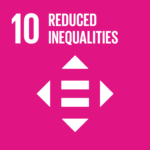What do enablers do ?
Many of us have witnessed the various, often covert, methods used by individuals, politicians, celebrities, entertainment, and the news media to minimize, deflect and excuse sexual violence. The same tired but ubiquitous justifications for abuse, such as “he was young,” “we all make mistakes,” “she is lying,” and “men are no longer safe if we take sexual assault this seriously.” The social uproar over sexual violence even sparked the #HimToo hashtag, which expresses sympathy for men who claim to have been falsely accused of sexual harassment, abuse, or assault. The truth is, violence exists not only if a blow strikes a body but also in circumstances that enable it and the systems that justify it.
RELEVANT SUSTAINABLE GOALS

WHAT IS ENABLERS ?
An enabler is someone who encourages another person to engage in a certain type of behavior. The term is most commonly associated with people who allow loved ones to behave destructively. Still, it can also be used positively, as in the case of empowerment. People act as negative enablers for various reasons, ranging from childhood dysfunction to fear, so enabling comes in many forms. All of them, in general, have negative consequences for both the enabler and the person they are enabling. This type of situation can be overcome, though counseling or professional assistance may be required.
While there’s no specific reason why would someone want to be an enablers, many people who enable do so because they genuinely want to help, but there is a distinction between helping and enabling behavior. Helping someone entails doing something for that person that he cannot do for himself, whereas enabling behavior entails doing something that he is perfectly capable of doing but chooses not to do.
Others help out of a desire not to be the “bad guy,” to exert control over the person, or out of denial, because admitting that a problem exists is too painful or frightening. Enablers may also be fearful of what would happen if they changed their behavior. Finally, others enable because of learned behavior from childhood — those who grew up with immature or addicted parents may be unaware of or uncomfortable with alternative ways of relating to others.
WHAT DO ENABLERS DO ?
There are at least six behaviours that can be categorised as enabling behaviours :
1. Keep quiet and do nothing when faced with the abuse
2. Make excuses for the abuser
3. Make excuses for their own acceptance of the abuse
4. Just like the abuser, enablers don’t take accountability for their contribution to the abuse
5. Feed off and spread the abusers lies
6. Make matters worse for the victim
These behaviours are something they have grown up with and they hardly recognise it as anything different from their normal everyday lives. They don’t challenge it. Simply because they don’t see the unjust nature of it all, but moreover they don’t want to be the ones breaking with their tradition. Their cultural beliefs and moral fabrication.
WHAT THE RIGHT THING TO DO ?
Enabling behaviour is as harmful as violent behaviour itself. While the enabling behaviour is not psychically harmful, it still negatively impact the victims. It is different from helping and supporting your loved ones. It comes from a desire to avoid conflict or an actual problem. Enablers chose to ignore the behaviour to maintain peace.
As an individual, we should silence the violence. Because if today we let something wrong happen, then tomorrow it would be treated as right and we will be blamed for it. If you have been doing this to someone, then it is high time to stop this behaviour to prevent further damage.
Also Read :
Is There A Female-Friendly Toilet ? Towards Gender Parity At Public Restrooms
The article was initially published on 25th November 2021.


